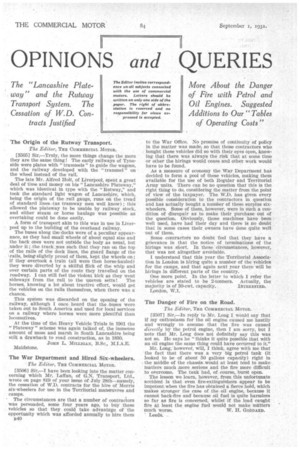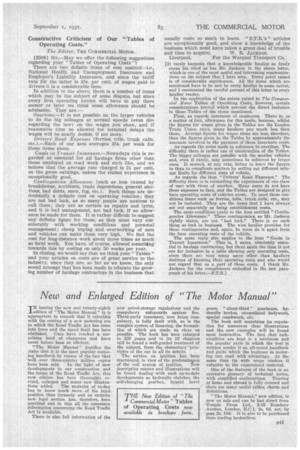OPINIONS and QUERIES
Page 58

Page 59

If you've noticed an error in this article please click here to report it so we can fix it.
The "Lancashire Plateway" and the Rutway Transport System. The Cessation of W.D. Con
tracts Justified
More About the Danger of Fire with Petrol and Oil Engines. Suggested Additions to Our "Tables of Operating Costs"
The Origin of the Rutway Transport.
The Editor, THE COMMERCIAL MOTOR.
[3505] Sir,—Truly, the more things change the more they are the same thing! The early railways of Tyneside were plates with " trammels " to guide the wagons, and the railway developed with the " trammel " on the wheel instead of the rail.
The late Mr. Alfred Holt, of Liverpool, spent a great deal of time and money on his "Lancashire Plateway," which was identical in type with the "Rutway," and took the standard light wagon of Lancashire, which, being the origin of the rail gauge, runs on the tread of standard lines-(as tramway men well know) ; this allowed the plateway to be usable by railway stock, and either steam or horse haulage was possible as overtaking could be done easily.
A form of transport akin to this was in use in Liverpool up to the building of the overhead railway.
The buses along the docks were of a peculiar appearance, as they had small wheels of about equal size and the back ones were not autSide the body as usual, but under it ; the track ,was such that they ran on the top of the rails of the dock lines, the guard flange of the being slightly proud of them, kept the wheels on; if they overtook a train (all were then horse-hauled) they were diverted by a skilful flick of the whip and over certain parts of the route they travelled on the roadway. I can still feel the violent kick as they went
sidewayst from the rail to the uneven setts! The horses, knowing a lot about tractive effort, would get the vehicles on the rails themselves, when there was a chance.
This system was discarded on the opening of the railway, although I once heard that the buses were taken out to South America and used for local services on a railway where horses were more plentiful than locomotives.
At the time of the, Heavy Vehicle Trials in 1901 the " Plateway " scheme was again talked of, the immense amount of moss and marsh in South Lancashire being still a drawback to road construction, as in 1830. JOHN L. MILLIGAN, B.Sc., M.I.A.E. Maidstone.
The War Department and Hired Six-wheelers. The Editor, THE COMMERCIAL MOTOR.
[3506] Sir,—I have been looking into the matter concerning which Mr. Laffan, of G.N. Transport, Ltd., wrote on page 819 of your issue of July 28th—namely, the cessation of W.D. contracts for the hire of Morris six-wheelers for use in the Territorial manceuvres and camps.
• The circumstances are that a number of contractors was persuaded, some four years ago, to buy these vehicles so that they could take advantage of the opportunity which was afforded annually to hire them B40
to the War Office. No promise of continuity of policy in the matter was made, so that those contractors who bought these vehicles did so with their eyes Open, knowing that there was always the risk that at some time or other the hirings would cease and other work would have to be found.
As a measure of economy the War Department has decided to form a pool of these vehicles, mailing them available for the use of both Regular and Territorial Army units. There can be no question that this is the right thing to do, considering the matter from the point of view of the taxpayer. The W.D. has given every possible consideration to the contractors in question and has actually bought a number of these surplus sixwheelers. Some of them, however, were in such a condition of disrepair as to make their purchase out of the question. Obviously, those machines have been well used, have had their day and there is no doubt that in some cases their, owners have done quite well out of them.
Some contractors no doubt feel that they have a grievance in that the notice of terminations of the hirings was short. In these circumstances, however, that was not altogether avoidable.
I understand that this year the Territorial Association in London is hiring quite a number of the vehicles for the camps, and that again next year there will be hirings in different parts of the country.
One more point. In the letter to which I refer the vehicles are stated to be 2-tonners. Actually, the
majority is of 30-cwt. capacity. IlcITERESTED. London, W.1.
The Danger of Fire on the Road.
The Editor, THE COMMERCIAL MOTOR.
[3507] Sir,—In reply to Mr. Long I would say that if my enthusiasm for the oil engine caused me hastily and wrongly to assume that the fire was caused directly by the petrol engine, then I am sorry, but I note that Mr. Long does not definitely say this was not so. He says he "thinks it quite possible that with an oil engine the same thing could have occurred to it."
Mr. Long,' however, will, I think, agree with me that the fact that there was a very big petrol tank (it looked to be of about 50 gallons capacity) right in the middle of the chassis would at least tend to make matters much more serious and the fire more difficult to overcome. The tank had, of course, burst open.
The lesson we learn, however, from this unfortunate accident is that even fire-extinguishers appear to be impotent when the fire has obtained a fierce hold, which makes stronger the case of the oil engine, because it cannot back-fire and because oil fuel is quite harmless so far as tire is concerned, whilst if the load caught fire at least the engine fuel would not make matters
much worse. W. H. GOLDARD. Leeds.
Constructive Criticism of Our "Tables of Operating Costs."
The Editor, THE COMMERCIAL MOTOR.
[3508] Sir,—May we offer the following suggestions regarding your "Tables of Operating Costs "?
There are two definite items, of cost omitted—i.e., National Health and Unemployment Insurance and Employer's Liability Insurance, and since the tariff rate for the latter is 45s. per cent, of wages paid to drivers it is a considerable Item.
In addition to the above, there is a number of items which may be the subject of some dispute, but since every firm operating lorries will have to pay them sooner or later we think some allowance should be advisable. They are :— Overtime.—It is not possible on the larger vehicles to do the big mileages at normal speeds (even disregarding the law) on the wages you show, and if reasonable time be allowed for terminal delays the wages will be nearly double, if not more.
Drivers' Road Expenses (ferries, tolls, trunk calls, etc.).—Each of our men averages 35s. per week for these items alone.
Goods in Transit Insurance.—Nowadays this is regarded as essential for all haulage firms other than those employed on road work and such like, and we believe that the average rate charged is 21 per cent, on the gross earnings, unless the claims experience is exceptionally good.
Contingencies Allowance (such as loss caused by breakdowns, accidents, trade depressions, general elections, bad debts, snow, fog, etc.). Such things are Undoubtedly a definite cost on operating vehicles ; they are not bad luck, as so many people are anxious to call them ; they are as certain as repairs and tyres, and it is bad management, not bad luck, if no allowance be made for them. It is rather difficult to suggest any definite figure for these, as they must vary considerably with working conditions and personal management; cheap buying and overworking of men and vehicles can make them very high. We find the cost for long-distance work about three times as much as local work. You have, of course, allowed something towards this by costing on only 50 weeks per year.
In closing, we would say that we think your." Tables" and your articles on costs are of great service to the industry, since they are, so far as we know, the only sound attempt that has been made to educate the growing number of haulage contractors in the business that usually costs so much to learn. " S.T.R.'s " articles are exceptionally good, and show a knowledge of the business which must have taken a great deal of trouble
and time to acquire. W. E. JACKSON,
Liverpool. For the Warpool Transport Co.
[It rarely happens that a knowledgeable haulier so freely opens his mind as has Mr. Jackson in the above letter, which is one of the most useful and interesting communications on the subject that I have seen. Every point raised is of considerable significance. All the items which are mentioned have to be met by every haulier to some extent, and I recommend the careful perusal of this letter to every haulier reader.
In the application of the points raised to rite 00.712411810• eial Motor Tables of Operating Costs, however, certain considerations prevail which prevent the direct inelusion in those Tables of the items mentioned.
First, as regards insurance of employees. There is, as a matter of fact, allowance for this made, because, whilst the figures for wages given in the Tables are the London Trade Union rates, many hauliers pay much less than these. Average figures for wages alone are less, therefore, than the figures given in the Tables by approximately the amounts involved in the payment of these insurance costs.
As regards the point made in reference to overtime. The difficulty there is rather one of construction of the Tables. The bigger mileages are possible with the smaller vehicles and, even if rarely, may sometimes be achieved by larger ones. It seemed, at any rate, better to leave the figures in than to complicate matters by setting out different mileage limits for different sizes of vehicle.
As regards the item "Drivers' Road Expenses," The difficulty there is in reconciling the experiences of one class of user with those of another. Many users do not have these expenses to face, and the Tables are designed to give bare operating costs of vehicles alone. To meet those conditions items such as ferries, tells, trunk calls, etc., may not be included. They are the items that I have always. set out separately as being establishment costs.
The same conditions apply to the item entitled "Contingencies Allowance." These contingencies as Mr. Jackson rightly states, are not "bad luck." There is no such thing as luck in business. The wise haulier provides for these contingencies and, again, he must do it apart from the bare operating costs of the vehicle.
The same reply also applies to the item "Goods in Transit Insurance." This is, I agree, absolutely essential in haulage contracting, but there again the item is not one for inclusion in a table •showing only operating costs, since there arc very many users other than hauliers desirous of knowing their operating costs and who would not regard that as a part of those costs. I thank Mr. Jackson for the compliments embodied in the last paragraph of his letter.—,S.T.R.]




































































































